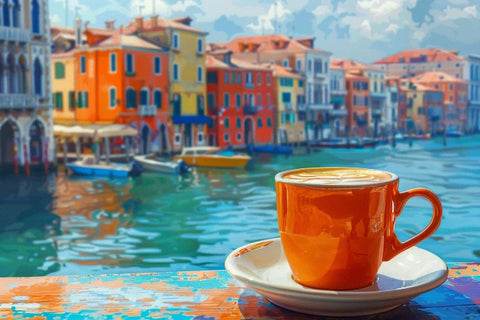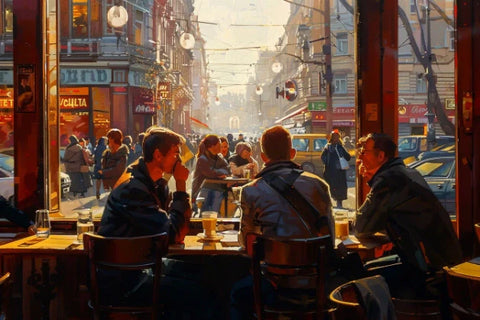Have you ever wondered which city drinks the most coffee?
Learn about the factors that influence coffee consumption, such as geographic location, culture, and economic factors.
Explore the top cities for coffee consumption, including Istanbul, Vienna, and Helsinki.
Discover what contributes to high coffee consumption in these cities, from coffee culture to economic factors.
Find out which other cities around the world are known for their love of coffee.
What Factors Influence Coffee Consumption?
Various factors influence coffee consumption globally. These factors include geographic location, culture, economic factors, age, and gender.Geographic location plays a significant role in determining the type of coffee consumed. For instance, in countries nearer to the equator, where coffee is often grown, there is a higher likelihood of a coffee-centric culture. Cultural preferences also heavily influence coffee consumption, with some societies favoring strong espresso shots while others prefer milky brews. Economic conditions impact both the affordability and accessibility of coffee.
Research shows that younger demographics tend to consume more specialty coffee drinks, while older age groups often opt for traditional black coffee. Gender differences also exist, with studies indicating variations in coffee preferences between men and women.
Geographic Location
One of the key factors influencing coffee consumption is geographic location, particularly in urban and metropolitan areas of various countries around the world.
The location of a city or region can play a significant role in shaping coffee consumption habits. For instance, in bustling cosmopolitan cities like Tokyo, residents have a strong culture of coffee appreciation, often opting for delicate pour-over brews in chic cafes.
On the other hand, in cities like Rome, espresso reigns supreme, reflecting the fast-paced lifestyle and love for strong, concentrated flavors. Per capita consumption data reveals interesting insights, with Scandinavian countries like Finland and Norway ranking highest in coffee consumption, while countries in Asia show a growing appetite for specialty coffee beverages.
Culture and Traditions
Culture and traditions play a significant role in shaping coffee consumption habits worldwide. Different customs and preferences influence the way coffee is consumed in various societies.
For example, in Italy, espresso is a cultural staple, often consumed in small quantities and enjoyed as a social ritual. Meanwhile, in countries like Ethiopia, coffee ceremonies are deeply rooted in tradition, symbolizing hospitality and community bonding. Research has shown that cultural practices impact not only how coffee is prepared but also when and with whom it is enjoyed. Understanding these cultural nuances is crucial in comprehending why certain regions have a stronger affinity towards coffee and how these habits evolve over time.
Economic Factors
Economic factors play a crucial role in determining the level of coffee consumption in different regions. The economic status of individuals and the overall economy of a country influence coffee habits.
For instance, in countries with strong economies, such as the United States and Germany, where disposable income is higher, there tends to be a higher coffee consumption rate. Conversely, in regions with struggling economies or lower income levels, people might opt for more affordable beverages or reduce their overall coffee intake.
Lifestyle choices also come into play, as individuals in fast-paced urban settings may rely more heavily on coffee for energy and productivity, leading to higher consumption levels. By analyzing these correlations, we can gain insights into how economic conditions and lifestyle factors intersect to shape coffee consumption patterns.
Age and Gender
Age and gender are important demographic factors that affect coffee consumption habits. Preferences and habits regarding coffee often vary among different age groups and genders.
For instance, studies have shown that younger individuals tend to lean towards specialty coffee drinks like cold brews and flavored lattes, while older generations may prefer traditional black coffee or espresso.
The data indicates that men are more likely to consume larger quantities of coffee compared to women, who may opt for smaller, more frequent servings throughout the day. These insights highlight the nuanced nature of coffee consumption patterns, influenced by factors beyond just personal taste preferences.
Top Cities for Coffee Consumption

Several cities around the world are known for their high coffee consumption rates. These cities have been ranked based on surveys and studies analyzing the coffee habits of their residents.
- Some of the top cities known for their coffee consumption include Seattle, Portland, and San Francisco in the United States, as well as Vienna in Austria and Helsinki in Finland.
- According to a recent survey, Seattle was ranked as the city with the highest coffee consumption per capita, with residents averaging over three cups of coffee per day. Portland and San Francisco closely follow, showing a strong coffee culture among metropolitan residents in these regions.
Istanbul, Turkey
Istanbul, Turkey, is renowned for its vibrant coffee culture and high coffee consumption rates. The city's coffee habits contribute to its top ranking in global coffee consumption.
Istanbul's coffee culture is deeply embedded in the city's social fabric, with a plethora of traditional coffeehouses, known as 'kıraathane,' serving as community hubs where locals gather to chat over a cup of rich Turkish coffee. The art of brewing and serving coffee is highly valued in Istanbul, with skilled baristas crafting intricate foam designs atop cups of aromatic coffee. Coffee is not just a beverage in Istanbul; it is a cherished ritual that symbolizes hospitality and connection among residents.
Vienna, Austria
Vienna, Austria, is a city known for its charming coffeehouses and traditional coffee culture. The coffee consumption practices in Vienna reflect its rich heritage and love for coffee.
Delving into the coffeehouse culture of Vienna, one can uncover a vibrant history intertwined with intellectual discourse, artistic inspiration, and political movements. Viennese cafes, dating back centuries, have been more than just places to savor a cup of coffee; they have served as hubs for writers, artists, and thinkers to gather, exchange ideas, and engage in meaningful conversations.
These cafes have played a pivotal role in shaping not only local customs but have also had a global influence on coffee traditions, with their emphasis on leisurely enjoyment and social interaction. The coffee culture in Vienna has intricately woven itself into the social fabric of the city, creating a unique atmosphere where people from all walks of life come together to share a cup of coffee and connect on a deeper level.
Helsinki, Finland
Helsinki, Finland, stands out as a city with a strong coffee culture and unique preferences for coffee consumption. The residents of Helsinki have distinctive coffee habits that contribute to the city's coffee consumption reputation.
Finnish people, including those in Helsinki, are known for their love of coffee and the ritualistic aspect of coffee breaks in their daily routine. Many Helsinki residents start their day with a cup of strong, dark coffee, often accompanied by a sweet pastry or a savory sandwich. Coffee is not just a beverage in Helsinki; it plays a significant role in social interactions and business meetings, with the concept of 'fika' or coffee breaks being deeply ingrained in the local culture.
Oslo, Norway
Oslo, Norway, boasts a thriving coffee scene influenced by its unique climate and Scandinavian coffee traditions. The city's coffee culture blends modern trends with traditional practices.The cool climate of Oslo often encourages residents and visitors alike to seek warmth and comfort in a cup of coffee, making it a staple beverage all year round. In addition to the popular coffee chains found throughout the city, Oslo is also dotted with cozy independent cafes that serve up specialty brews sourced from ethical and sustainable suppliers. Norwegians in general have a deep-rooted appreciation for coffee, with a strong emphasis on quality and craftsmanship. This emphasis is reflected in Oslo's coffee culture, where baristas are highly skilled and take pride in their artistry, crafting each cup with precision and care.
Berlin, Germany
Berlin, Germany, is a city with a rich coffee culture and a diverse cafe scene. The urban residents of Berlin engage in vibrant coffee consumption practices that reflect the city's dynamic atmosphere.
Coffee in Berlin is not just a beverage; it's a way of life. From traditional espresso shots to craft pour-over methods, Berliners take their coffee seriously. The cafe culture here goes beyond just serving drinks; it's a social hub where people gather to chat, work, or simply unwind. Berlin's coffee scene is known for its emphasis on quality and sustainability, with many cafes sourcing beans locally and offering unique blends. As a result, urban coffee trends have emerged, making Berlin a top destination for coffee enthusiasts seeking new flavors and experiences.
Factors Contributing to High Coffee Consumption in These Cities

Several factors contribute to the high levels of coffee consumption in the top cities mentioned. These factors include coffee culture, availability and accessibility of coffee, economic conditions, and climate.
Cultural influences play a significant role in shaping the coffee habits of urban residents in these bustling cities. For instance, in cities where coffee is deeply embedded in the local culture, such as art and music hubs, coffee consumption tends to be more prevalent.
The variation in economic factors across these cities also impacts coffee consumption patterns. In cities with higher disposable incomes, residents may be more inclined to frequent upscale coffee shops or invest in specialty coffee blends.
Climate conditions, such as colder temperatures, may also drive higher coffee consumption as residents seek warmth and comfort through a hot cup of coffee.
Coffee Culture and Tradition
The rich coffee culture and traditions in these cities play a significant role in fostering high coffee consumption rates. The cultural value of coffee influences residents' habits and preferences.
Coffee has become more than just a morning pick-me-up; it is a social and cultural institution deeply embedded in the daily lives of city dwellers. From the historic coffeehouses of Vienna where intellectuals once gathered to the artisanal coffee shops of Portland known for their hipster vibe, each city has its unique way of celebrating and enjoying coffee.
Over the years, coffee customs have diversified and transformed, with each culture adding its own flair and practices to the global coffee scene. This evolution reflects how coffee has gone beyond mere refreshment to become a symbol of urban lifestyle and identity.
Availability and Accessibility of Coffee
The easy availability and accessibility of coffee in these cities contribute to their high coffee consumption rates. The diverse selection of coffee options in coffeehouses and cafes enhances the coffee experience for residents.Cities with a strong coffee culture often see a symbiotic relationship between the easy access to coffee and the high demand among locals. Coffeehouses and cafes not only provide a space for social gatherings but also serve as hubs for unique coffee blends and brewing methods that cater to different preferences. The wide array of coffee varieties available, ranging from single-origin beans to specialty blends, plays a significant role in shaping consumer preferences and driving the thriving coffee scene in these bustling urban centers.
Read: Blends VS Single Origin Coffee: Which Is Right For You?
Economic Factors
Economic factors such as income levels and purchasing power influence the coffee consumption habits of residents in these cities. The economic prosperity of a city plays a role in determining coffee consumption patterns.
Individuals living in urban areas often adjust their coffee consumption habits based on their financial means and overall economic well-being. For instance, in cities with higher average incomes, where residents have greater purchasing power, there tends to be a higher demand for premium coffee products and specialty blends. Conversely, in cities facing economic challenges or lower income distribution, residents may opt for more affordable coffee options or prioritize other expenditures over gourmet coffee experiences. These lifestyle choices are intricately linked to the economic conditions prevalent in each city, showcasing how economic factors shape and influence coffee consumption behaviors on a societal level.
Climate and Weather
The climate and weather conditions in these cities affect coffee consumption habits. European cities may have different coffee preferences based on their climate compared to American cities.
For example, in cities with colder climates, residents may lean towards warmer coffee beverages such as lattes and cappuccinos to combat the chilly weather. On the other hand, in warmer cities, iced coffee and cold brews may be more popular choices to beat the heat. Seasonal variations also play a significant role; for instance, during the winter months, hot drinks tend to be favored, while in the summer, iced coffee sales may surge.
Read: 7 Summer Coffee Recipes That Are Perfect For Warm Weather
Other Cities with High Coffee Consumption

Apart from the top cities mentioned, several other cities globally are known for their high coffee consumption rates. These cities have been identified through surveys and studies focusing on coffee habits.
- Cities such as Seattle, Vancouver, and Melbourne stand out for their robust coffee culture and high level of coffee consumption. Surveys indicate that Seattle residents consume an average of three cups of coffee per day, with a preference for artisanal blends and specialty roasts.
- Vancouver boasts a thriving coffee scene, with a strong emphasis on ethically sourced beans and a variety of brewing methods.
- Melbourne, known for its vibrant cafe culture, has residents who take their coffee seriously, often choosing third-wave coffee shops for their daily caffeine fix.
Amsterdam, Netherlands
Amsterdam, Netherlands, is a city with a vibrant coffee culture reflected in its numerous coffeehouses and cafes. The residents of Amsterdam actively participate in coffee consumption, contributing to the city's coffee reputation.Exploring the coffeehouse and cafe scene in Amsterdam offers a glimpse into the dynamic social life of the city's inhabitants. Unlike some cities where coffee is more of a takeaway convenience, in Amsterdam, coffee establishments serve as gathering spots for locals to relax, socialize, and conduct business meetings.
The cozy and inviting ambiance of these cafes attracts a diverse crowd, from young professionals catching up over espressos to artists finding inspiration with a cup of cappuccino. This cultural norm of coffee consumption shapes the daily routines and interactions of Amsterdam's residents, emphasizing the importance of leisurely moments amidst the bustling city life.
Copenhagen, Denmark
Copenhagen, Denmark, is known for its Scandinavian coffee traditions and high coffee consumption rates. The residents of Copenhagen exhibit a strong affinity for coffee, making it a top city for coffee enthusiasts.
Coffee in Copenhagen is not just a drink; it's a cultural experience and integral part of daily life. Danish coffee culture emphasizes quality over quantity, with an emphasis on slow, mindful consumption.
In Copenhagen, coffee plays a significant role in social interactions, with cozy cafes serving as popular meeting spots for friends and business meetings alike. The concept of 'hygge,' which centers around coziness and contentment, is often intertwined with coffee gatherings in Copenhagen, creating a warm and inviting atmosphere for residents and visitors to enjoy.
Brussels, Belgium
Brussels, Belgium, is a city with a diverse coffee scene and distinctive consumption preferences. The residents of Brussels enjoy a variety of coffee offerings, contributing to the city's reputation as a coffee hub.
Known for their penchant for specialty concoctions, the people of Brussels often opt for artisanal blends and unique brewing methods. From cozy neighborhood cafes to trendy coffee houses, the city's coffee culture is a vibrant mosaic of tradition and innovation. Unlike some other European cities where espresso reigns supreme, Brussels embraces a range of coffee styles, including the beloved cafe latte and velvety cappuccino. This openness to diverse coffee experiences sets Brussels apart and adds to its allure as a must-visit destination for coffee enthusiasts.
Reykjavik, Iceland
Reykjavik, Iceland, boasts a thriving coffeehouse culture and high coffee consumption rates. The residents of Reykjavik have developed unique coffee habits that reflect the city's appreciation for quality coffee.
In Reykjavik, coffee serves as a vital thread weaving through the city's social fabric, with coffeehouses acting as community hubs where residents gather to relax, socialize, and conduct business. It is not merely about consuming caffeine but rather embracing a lifestyle centered around coffee.
The bustling coffee scene in Reykjavik is fueled by factors such as the chilly climate that makes a warm cup of coffee all the more inviting, the influence of Nordic coffee traditions, and a growing interest in specialty coffee blends and brewing methods.
Seattle, USA
Seattle, USA, is recognized for its strong coffee culture and high levels of coffee consumption among urban residents. The city's vibrant coffee scene has contributed to its reputation as a top destination for coffee lovers.The unique blend of historical significance and contemporary innovation in Seattle's coffee industry sets it apart from other cities. From the birth of the iconic Starbucks chain to the rise of independent roasteries and third-wave coffee shops, Seattle's coffee heritage is deeply ingrained in its identity.
Read: 8 Specialty Coffee Hubs In The USA
Residents in Seattle do not just drink coffee as a beverage; they embrace it as a cultural symbol and a vital part of their daily lives. The rituals around coffee consumption, such as morning espresso runs or meeting friends at local cafes, have become ingrained in the fabric of urban living in Seattle.

